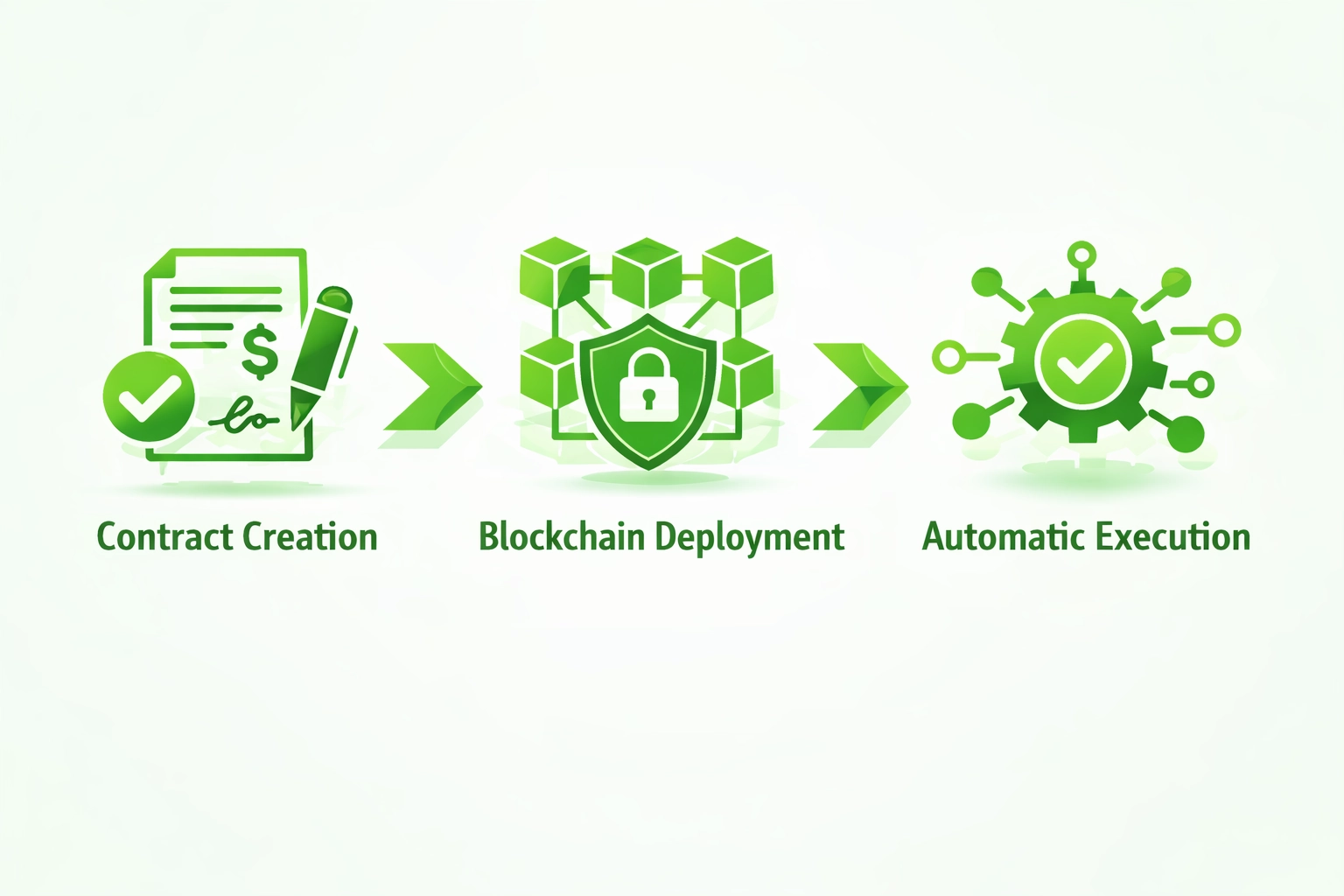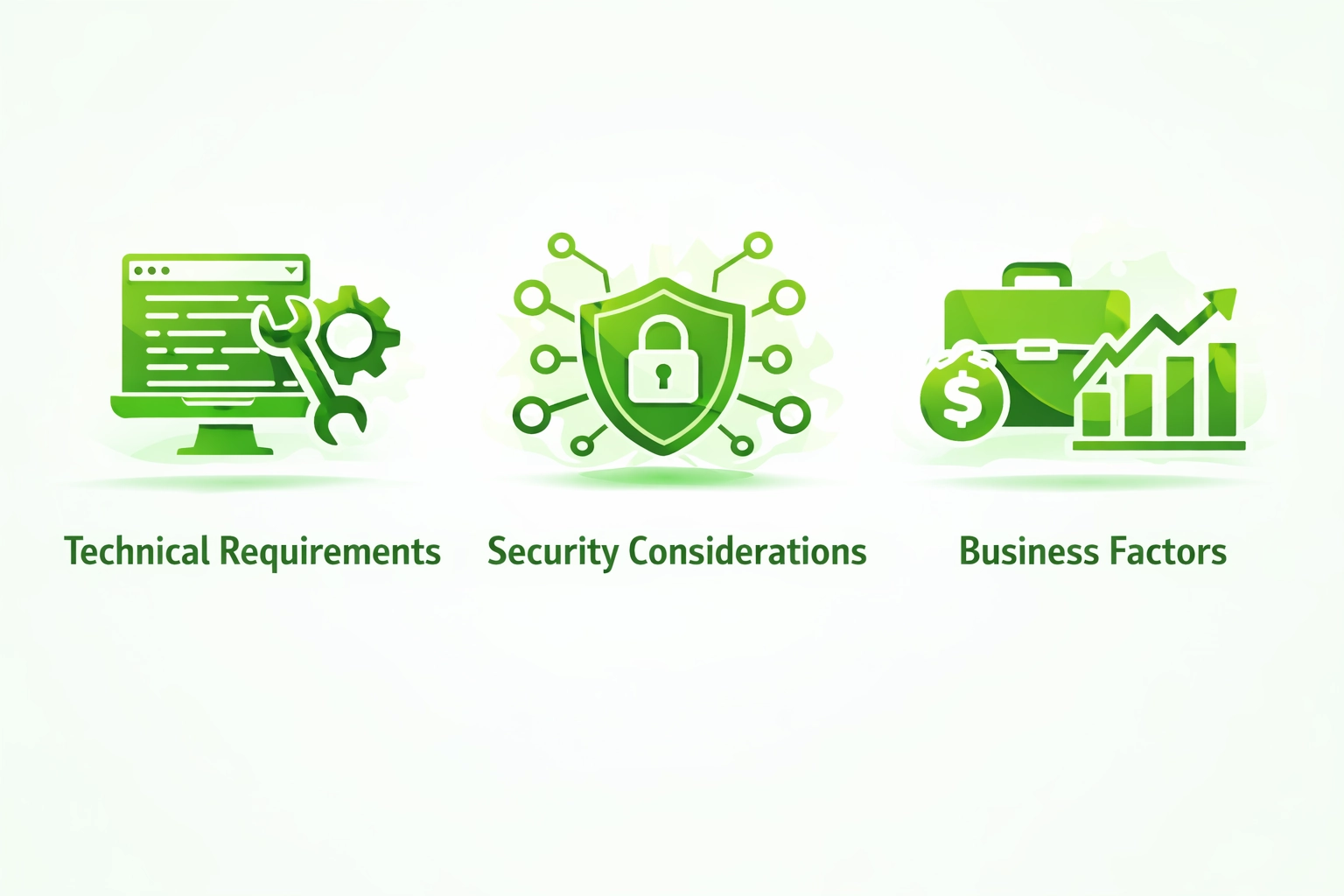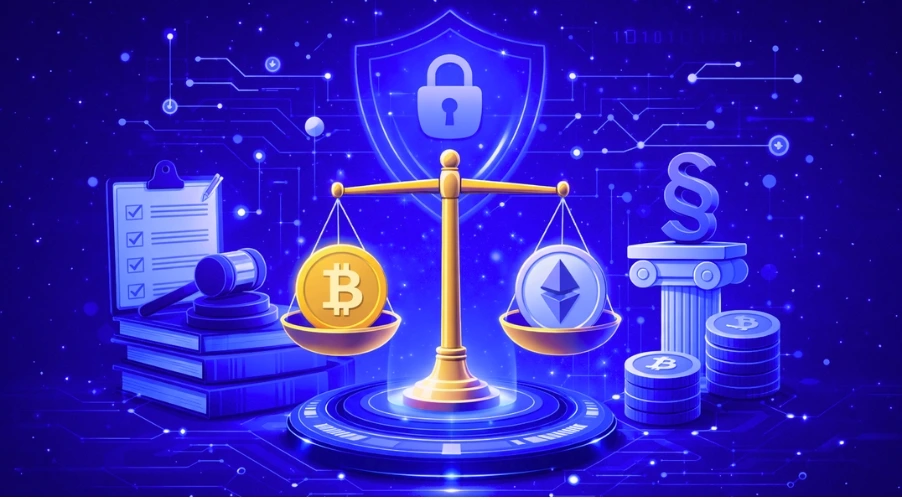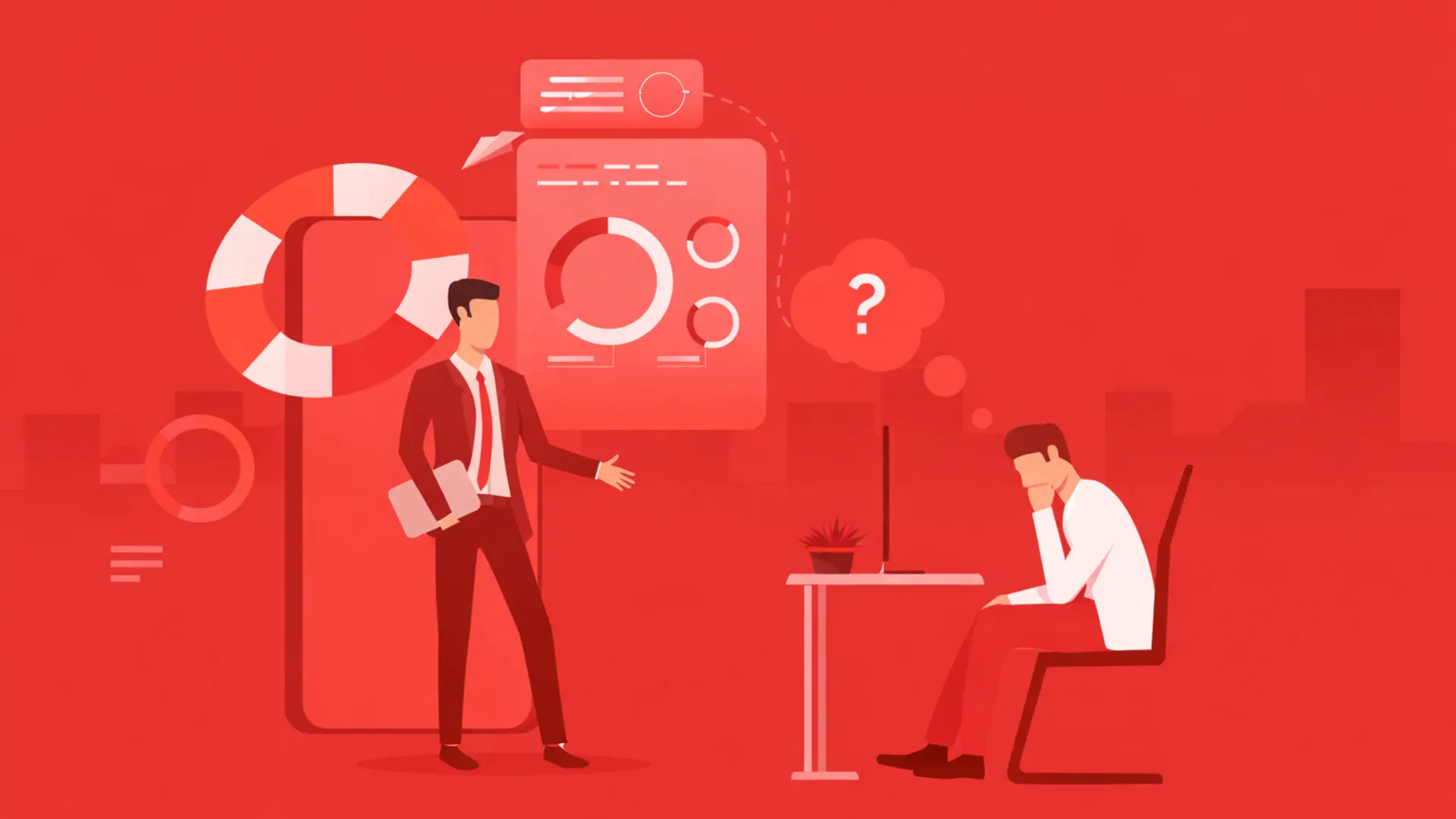Key Takeaways
- Self executing smart contracts automatically enforce and execute agreement terms when predefined conditions are met, eliminating the need for intermediaries.
- These contracts operate on blockchain networks across USA, UK, UAE, and Canada, providing immutable, transparent, and tamper-proof transaction records.
- Triggers for self executing smart contracts include time-based events, oracle data feeds, on-chain transactions, and external API inputs.
- Solidity, Rust, and Vyper are the primary programming languages used to build self executing smart contracts on various blockchain platforms.
- Security mechanisms include cryptographic verification, consensus validation, and formal verification to protect self executing smart contracts from vulnerabilities.
- Real-world applications span DeFi protocols, supply chain management, insurance claims processing, and real estate transactions globally.
- Legal recognition of self executing smart contracts continues evolving, with many jurisdictions now accepting them as enforceable digital agreements.
- Future advancements include AI integration, cross-chain interoperability, and enhanced privacy features for self executing smart contracts in Web3.
What Are Self-Executing Smart Contracts?
Self executing smart contracts represent a revolutionary approach to digital agreements, combining programmable logic with blockchain immutability to create automated, trustless systems. With over eight years of experience building enterprise blockchain solutions across USA, UK, UAE, and Canadian markets, our agency has witnessed these contracts transform how businesses handle transactions, agreements, and data exchange. At their core, self executing smart contracts are computer programs stored on blockchain networks that automatically execute predefined actions when specific conditions are satisfied. Unlike traditional contracts requiring manual enforcement, these digital agreements operate autonomously, eliminating intermediaries while ensuring transparent, verifiable execution.
Why Self-Executing Smart Contracts Matter in Blockchain
Self executing smart contracts form the foundational infrastructure enabling blockchain’s true potential. They matter because they solve fundamental trust issues in digital transactions by replacing human oversight with deterministic code execution. When parties in New York, London, Dubai, or Toronto need to transact without knowing or trusting each other, self executing smart contracts provide the neutral, automated enforcement mechanism that makes trustless commerce possible. They reduce transaction costs by eliminating intermediary fees, accelerate settlement times from days to seconds, and create permanent audit trails that enhance accountability across all participating parties.

How Self-Executing Smart Contracts Work Step-by-Step
Contract Creation
- Code logic written in Solidity
- Conditions defined precisely
- Actions programmed clearly
- Testing completed thoroughly
Blockchain Deployment
- Contract compiled to bytecode
- Transaction submitted to network
- Address assigned permanently
- Code becomes immutable
Automatic Execution
- Conditions monitored continuously
- Triggers detected automatically
- Actions executed instantly
- Results recorded permanently
Key Components of a Self-Executing Smart Contract
| Component | Function | Importance |
|---|---|---|
| State Variables | Store contract data permanently | Critical for data persistence |
| Functions | Execute contract logic | Core business operations |
| Events | Emit logs for tracking | Off-chain notification |
| Modifiers | Control function access | Security enforcement |
| Constructor | Initialize contract state | One-time setup |
Transform Your Business with Self Executing Smart Contracts
Our blockchain experts build secure, efficient self executing smart contracts tailored to your business needs. Automate agreements and reduce costs today.
Role of Blockchain Networks in Smart Contract Execution
Blockchain networks provide the essential infrastructure enabling self executing smart contracts to function reliably. The decentralized network of nodes validates each transaction, ensuring contract execution follows programmed logic exactly. Consensus mechanisms like Proof of Stake guarantee that all participants agree on the current state of every contract. Enterprises across USA, UK, UAE, and Canada rely on these networks to provide immutable execution environments where contract outcomes cannot be manipulated by any single party.
Network Standard: Ethereum processes over 1 million self executing smart contract transactions daily, demonstrating enterprise-grade reliability.
Smart Contract Triggers: Conditions That Activate Execution
| Trigger Type | Description | Example Use Case |
|---|---|---|
| Time-Based | Block timestamp conditions | Vesting schedules, loan maturity |
| Oracle Data | External data feeds | Price feeds, weather data |
| User Transaction | Direct function calls | Token transfers, swaps |
| Contract Events | Inter-contract communication | Multi-step workflows |
| Balance Threshold | Fund level conditions | Liquidations, distributions |
How Code Replaces Intermediaries in Self-Executing Contracts
Self executing smart contracts fundamentally transform traditional business processes by replacing human intermediaries with deterministic code. Escrow services, notaries, clearinghouses, and settlement agents all become unnecessary when contract logic handles these functions automatically. A real estate transaction in Dubai that traditionally requires multiple intermediaries can execute through self executing smart contracts with instant settlement. This disintermediation reduces costs by 40-90% while eliminating processing delays that previously took days or weeks.
Cost Reduction Potential
Continuous Operation
Settlement Speed
Popular Programming Languages Used for Smart Contracts
Solidity dominates the self executing smart contracts landscape as Ethereum’s native language, powering over 80% of deployed contracts. Rust has emerged as the preferred choice for Solana and NEAR protocols, offering memory safety and performance advantages. Vyper provides a security-focused alternative for Ethereum with simplified syntax that reduces attack surfaces. Move, created by Meta, powers Aptos and Sui blockchains with unique resource-oriented programming paradigms designed specifically for digital asset management.
Self Executing Smart Contract Lifecycle
Requirements Analysis
Define business logic, conditions, and expected outcomes for the self executing smart contract.
Architecture Design
Plan contract structure, data models, and interaction patterns for optimal performance.
Code Implementation
Write clean, secure Solidity code following best practices and security patterns.
Unit Testing
Test individual functions in isolation to verify logic correctness and edge cases.
Security Audit
Professional security review to identify vulnerabilities before mainnet deployment.
Testnet Deployment
Deploy to test networks for real-world simulation and final validation testing.
Mainnet Launch
Deploy self executing smart contract to production blockchain with verified code.
Monitoring and Maintenance
Continuous monitoring of contract performance, events, and potential issues.
Security Mechanisms Behind Self-Executing Smart Contracts
Security in self executing smart contracts operates through multiple layers including cryptographic validation, consensus verification, and access control patterns. Reentrancy guards prevent recursive call attacks that drained $60 million from The DAO. Overflow protection in Solidity 0.8+ prevents arithmetic vulnerabilities. Access modifiers restrict function execution to authorized addresses only. Our agency recommends comprehensive security audits for all self executing smart contracts managing significant value across USA, UK, UAE, and Canadian markets.[1]
Benefits of Self-Executing Smart Contracts for Businesses
Cost Reduction
- Eliminate intermediary fees
- Reduce administrative overhead
- Lower dispute resolution costs
- Minimize fraud losses
Operational Efficiency
- 24/7 automated execution
- Instant settlement times
- Reduced manual processing
- Scalable operations
Trust and Transparency
- Immutable execution records
- Verifiable contract logic
- Transparent audit trails
- Reduced counterparty risk
Real-World Use Cases of Self-Executing Smart Contracts
| Industry | Use Case | Business Impact |
|---|---|---|
| DeFi | Automated lending/borrowing | $50B+ TVL managed |
| Insurance | Parametric claims processing | Claims paid in minutes |
| Supply Chain | Automated payments on delivery | 30% faster settlements |
| Real Estate | Tokenized property ownership | Fractional investment enabled |
| Gaming | NFT ownership and trading | $10B+ annual volume |
Limitations and Challenges of Self-Executing Smart Contracts
Despite their advantages, self executing smart contracts face significant challenges. Immutability means bugs cannot be easily fixed after deployment. Oracle dependency creates external trust requirements. Gas costs on Ethereum mainnet can make small transactions uneconomical. Scalability limitations restrict throughput during high-demand periods. Enterprises must carefully evaluate these factors when implementing self executing smart contracts for mission-critical operations.

Smart Contract Platform Selection Criteria
Technical Requirements
- Transaction throughput needs
- Finality time requirements
- Language preferences
- Tooling ecosystem maturity
Security Considerations
- Network decentralization
- Audit availability
- Historical security record
- Upgrade mechanisms
Business Factors
- Transaction cost projections
- Regulatory compliance
- Ecosystem partnerships
- Long-term viability
Legal Validity and Compliance of Self-Executing Smart Contracts
| Jurisdiction | Legal Framework | Recognition Status |
|---|---|---|
| USA | State-level legislation | Recognized in many states |
| UK | Law Commission guidance | Legally enforceable |
| UAE | DIFC framework | Progressive recognition |
| Canada | Provincial variations | Evolving framework |
Industry Standards for Self Executing Smart Contracts
Standard 1: All self executing smart contracts must undergo professional security audits before mainnet deployment.
Standard 2: Implement comprehensive test coverage exceeding 95% for all contract functions and edge cases.
Standard 3: Use established security patterns including reentrancy guards and access control modifiers.
Standard 4: Document all contract functions, parameters, and expected behaviors thoroughly.
Standard 5: Implement upgrade mechanisms for contracts managing significant value or requiring future modifications.
Standard 6: Monitor deployed contracts continuously for unusual activity and potential security threats.
The Future of Self-Executing Smart Contracts in Web3
The future of self executing smart contracts points toward greater sophistication, interoperability, and mainstream adoption. Account abstraction will enable more intuitive user experiences without compromising security. Cross-chain protocols will allow contracts to execute across multiple blockchains seamlessly. AI integration will enable adaptive contracts that optimize execution parameters dynamically. Zero-knowledge proofs will add privacy layers while maintaining verifiability.
With eight years of experience building self executing smart contracts for enterprises across USA, UK, UAE, and Canada, our agency has observed consistent growth in adoption and sophistication. We anticipate self executing smart contracts will become foundational infrastructure for digital commerce, financial services, and governance systems. Organizations investing in this technology today position themselves for significant competitive advantages in the emerging Web3 economy.
Build Powerful Self Executing Smart Contracts
Partner with our experienced team to implement secure, efficient self executing smart contracts for your business applications.
Frequently Asked Questions
Self executing smart contracts are blockchain-based programs that automatically enforce and execute agreement terms when predetermined conditions are met. They operate without intermediaries, using coded logic to trigger actions like payments, asset transfers, or data updates once specific criteria are satisfied on the network.
Unlike traditional contracts requiring manual enforcement and third-party intermediaries, self executing smart contracts automate execution through blockchain code. They eliminate human intervention, reduce processing time from days to seconds, and provide immutable records that cannot be altered after deployment.
Self executing smart contracts activate through specific triggers including time-based conditions, external data from oracles, on-chain events, or user transactions. When the contract detects these predetermined conditions are satisfied, it automatically executes the programmed actions without requiring manual intervention.
Self executing smart contracts can be legally binding in USA and UK when they meet traditional contract requirements including offer, acceptance, consideration, and intent. Many jurisdictions now recognize electronic agreements, though legal frameworks continue evolving to address blockchain-specific considerations and enforcement mechanisms.
Solidity remains the dominant language for Ethereum-based self executing smart contracts. Other popular options include Rust for Solana, Vyper for security-focused Ethereum contracts, and Move for Aptos/Sui. Each language offers different features suited to specific blockchain platforms.
Security risks include code vulnerabilities, reentrancy attacks, oracle manipulation, and logic errors that cannot be easily corrected post-deployment. The immutable nature of self executing smart contracts means bugs can result in permanent fund losses, making thorough auditing essential before launch.
Deployment costs for self executing smart contracts vary based on blockchain network, code complexity, and network congestion. Ethereum mainnet deployments range from $50 to $5,000+ in gas fees, while Layer 2 solutions and alternative chains offer significantly lower costs for businesses.
Reviewed & Edited By

Aman Vaths
Founder of Nadcab Labs
Aman Vaths is the Founder & CTO of Nadcab Labs, a global digital engineering company delivering enterprise-grade solutions across AI, Web3, Blockchain, Big Data, Cloud, Cybersecurity, and Modern Application Development. With deep technical leadership and product innovation experience, Aman has positioned Nadcab Labs as one of the most advanced engineering companies driving the next era of intelligent, secure, and scalable software systems. Under his leadership, Nadcab Labs has built 2,000+ global projects across sectors including fintech, banking, healthcare, real estate, logistics, gaming, manufacturing, and next-generation DePIN networks. Aman’s strength lies in architecting high-performance systems, end-to-end platform engineering, and designing enterprise solutions that operate at global scale.







